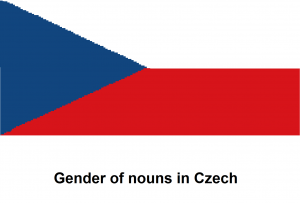Language/Czech/Grammar/Gender-of-nouns
Jump to navigation
Jump to search
Rate this lesson:
Hello Everyone, 😊
In today’s lesson we are going to study the following topic: ”GENDER OF NOUNS” in Czech
Please feel free to edit this page if you think it can be improved!
Happy learning!
Consider exploring these related pages after completing this lesson: Possessive Case in Czech, Instrumental Case in Czech, How to Use Be & How to Use "Být" (to Be).
A pretty reliable rule of thumb for determining the gender of nouns other than human masculine animates, is as follows:
Masculine in Czech[edit | edit source]
- Most nouns ending in a consonant, e.g. hrad ‘castle’, kufr ‘suitcase’, vlak ‘train’, stroj ‘machine’, čaj ‘tea’ [Some ending in a ‘soft’ or ‘ambivalent’ consonant are feminine, e.g. píseň ‘song’, tramvaj ‘tram’
Feminine in Czech[edit | edit source]
- Most nouns ending in -a, -e or the suffix -ost meaning ‘-ness’, e.g. voda ‘water’, lekce ‘lesson’, radost ‘joy, happiness’ [A few ending in -e are neuter, e.g. moře ‘sea’, pole ‘field’
Neuter in Czech[edit | edit source]
- Most nouns ending in -o or -í, e.g. město ‘town’, auto ‘car’, stavení ‘building’, náměstí ‘square’
Source[edit | edit source]
http://utkl.ff.cuni.cz/~rosen/public/GGG/Czech_essent_grammar.pdf
Videos[edit | edit source]
Learn Czech Grammar - Grammatical gender - YouTube[edit | edit source]
Other Lessons[edit | edit source]
- Comaratives and Superlatives
- Negation
- How to use the Modal Verb (Can)
- Future Tense
- Pronouns
- Questions
- Indefinite articles in Czech
- Inclusive Case in Czech
- Plural
- Adjectives

